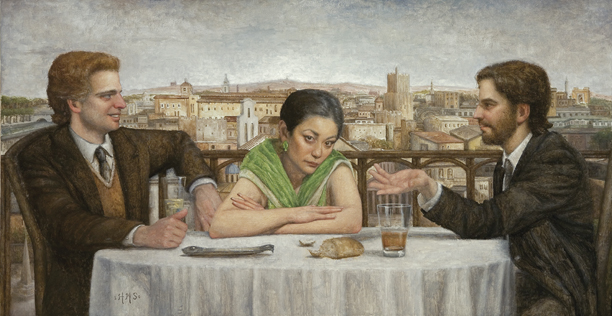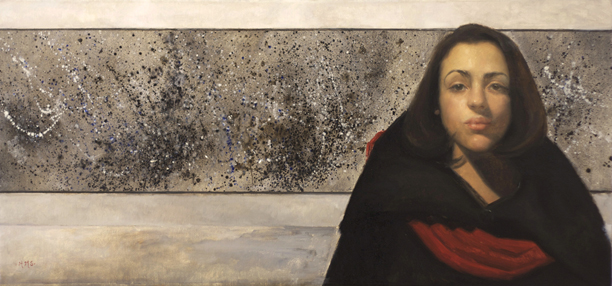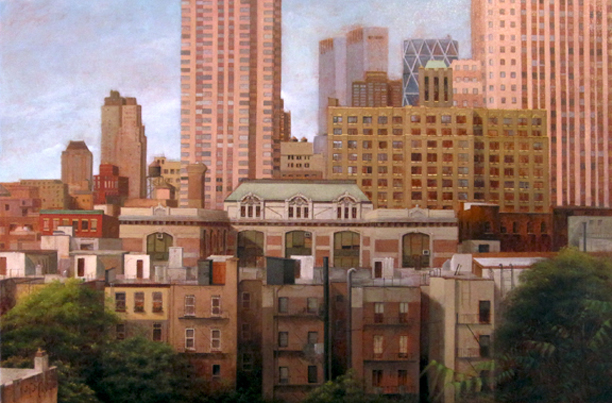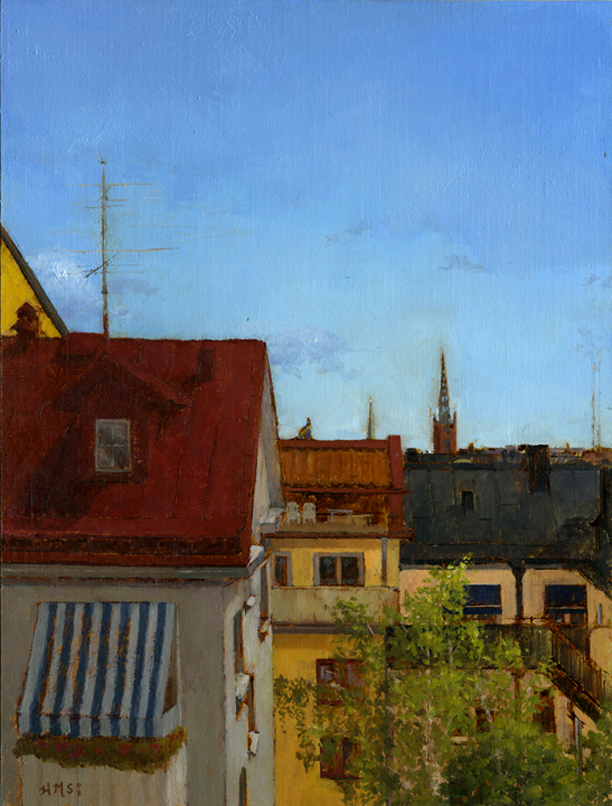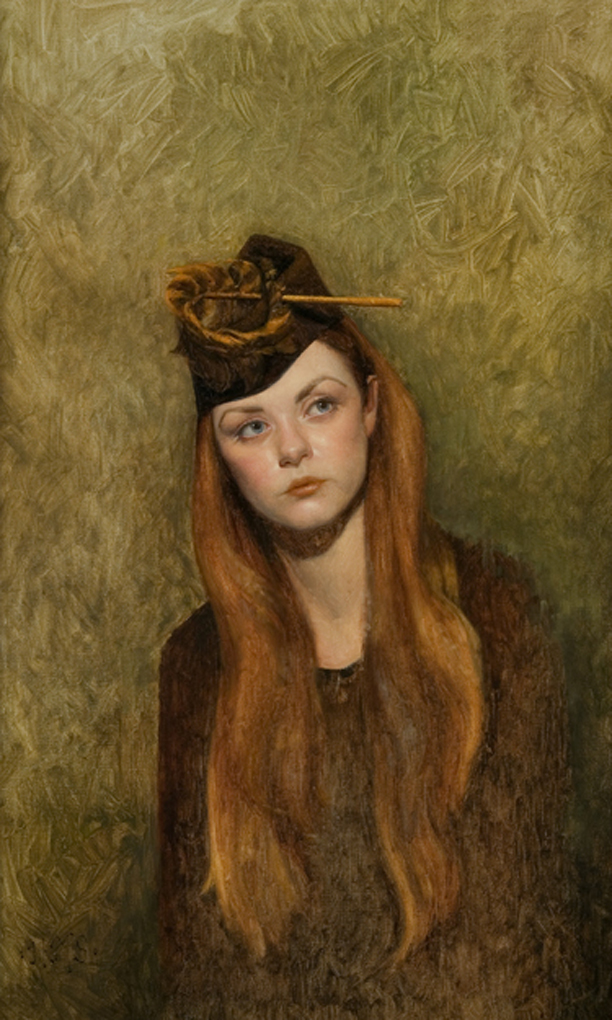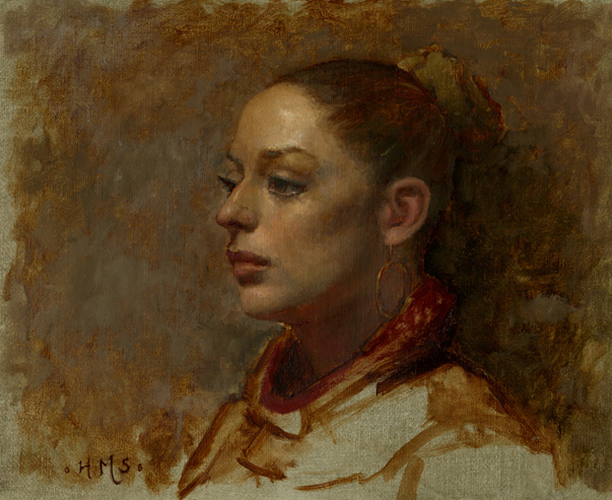Today we have the third interview in my artist profile series. It’s funny how I didn’t think I knew many artists. Then I started thinking about this series and really making a list of people I know who are practicing artists, and actually it turns out I know quite a few. Try it sometime. You might find that you’re actually surrounded by creative people. In any case, today I’m visiting with Hyeseung Marriage-Song. We went to undergrad together and crossed paths by way of dorms / RA groups and the like, although I didn’t realize she was such a talented artist until our paths crossed again after college (and after she had started painting). What amazing work! Here we go.
“Across the Table”, oil on linen, 2010, “Modern Beauty” oil on linen, 2010
How did you get into studio art and specifically painting?
I didn’t start painting until I was about 26, which is considered pretty late for a representational painter. When I was very young, starting around when I was 3, I would draw and do crafts on my own. I am a first-generation immigrant and my mother and father were not helicopter parents and they left me and my brother alone to do our own thing. I really wanted to be an artist or an interior designer, but my family ended up moving to a competitive school district that didn’t really have any visual arts programs (music was their focus), and I got tracked into doing other stuff. I was in my mid-twenties and doing two degrees at Harvard in disciplines apparently unrelated to the arts, before I realized that what I truly wanted was to live a creative and more independent life. I dropped out of grad school and with the support and encouragement of my then-fiance, now-husband, I started painting on my own and ultimately moved to New York to attend school. The first time I used oil paints, it was like reliving the best part of my childhood, except that I’d never painted as a kid.
“View from Hell’s Kitchen Studio,” oil on linen, 2010, “View from Kungsholmen Balcony” , oil on linen on panel, 2008
You are one of the few artists out there working in a traditional figurative tradition. What draws you to this type of expression and your subject matter?
I’ve always been more drawn to representational expression, in both visual art and literature. When I started painting, I had a more loose or “painterly” style. My subsequent training in the French Beaux Arts tradition influenced me a great deal and I became more specific and naturalistic in my style, though I don’t think of my work as being “tight” or “photographic” as some people might describe it. I’ve always been most captivated by the challenges and rewards of capturing people. I don’t think artists necessarily choose how they are going to work or the subjects that draw them in: it is sort of imprinted on them. I did, for a while early on, experiment with abstraction and enjoyed it immensely, but ultimately didn’t feel “called” by this particular mode of expression and the attendant emotional experience, and came back to representation. Interestingly, the truism that representational figure painters are scarce is losing validity: more and more artists are returning to this type of training and the craft associated with capturing the human figure.
“Girl in a Feathered Hat,” oil on linen, 2010, “Inspiration Lies on Top,” oil on linen, 2009, “Italian Girl,” or “Dancing Girl,” oil on linen on panel, 2008
Who would you say holds the greatest influence on your work?
The list changes all the time, and probably a couple of years ago I would have interpreted this question as an opportunity to list my all-time favorite oil painters. These days, however, what influences my work are more the ideas that I have always thought about, even when I wasn’t a painter yet and in college and grad school: the essential nature of humanity; the possibility of freedom in living and creating in the face of environmental and genetic determinants; the nature and scope of creativity; and the responsibilities and role an artist must fulfill. Visually I think the artists who help me most in thinking about these issues are Whistler, Caravaggio, Velazquez, Hopper and Freud. Conceptually, I look to philosophers such as Plato, Kant, Hegel and Habermas, writers such as Dosteovsky and Tolstoy, and contemporary intellectuals such as the biologist E.O. Wilson and the theologian Elaine Pagels.
Thanks Hyeseung! Can’t wait to see more of your work. And I think I see a commissioned portrait in the future… just need to sell me some hardware.
